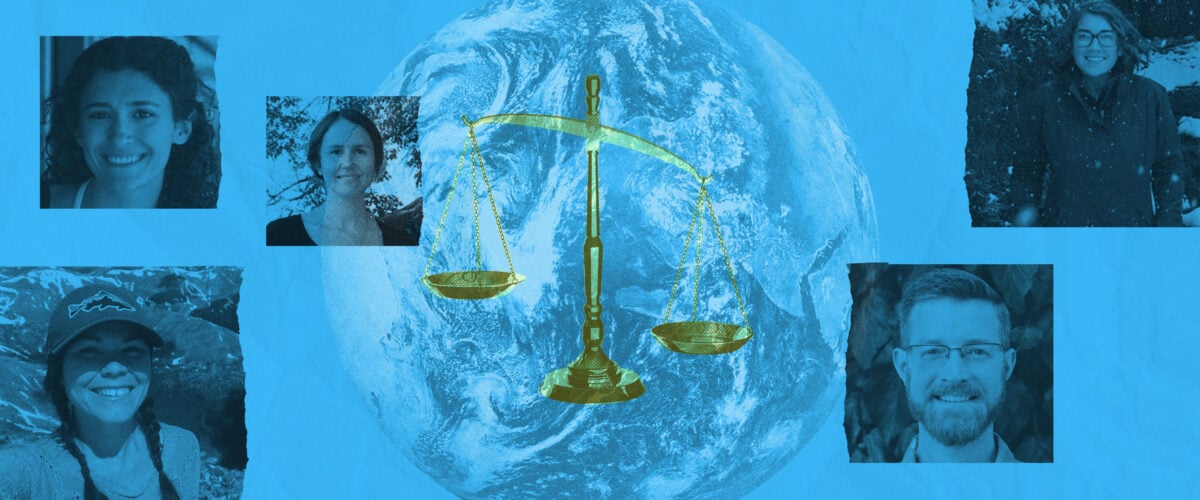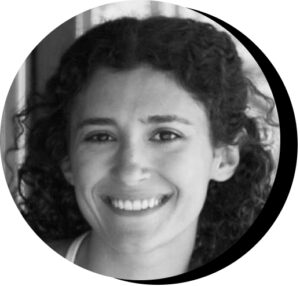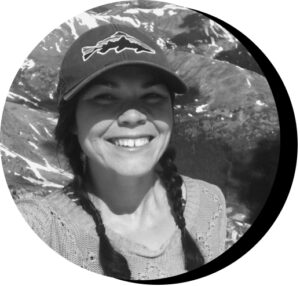Meet the Lawyers Fighting for Our Food, Water, and Climate
Published Apr 23, 2024

Our legal team works tirelessly to protect our health and environment through the legal system. Learn more about them and their work!
Food and Water Watch’s legal team consists of deeply committed, and passionately devoted lawyers who care about fighting for safe food, clean water, and a livable climate for all of us.
In these interviews, I sat down with each member of the team to talk about why Food & Water Watch’s issues are important to them and what it’s like fighting to protect our food, water, and climate. Keep reading to find out what a day in the life of a Food & Water Watch lawyer looks like! These interviews were edited for clarity and length.

Meet Legal Director Tarah Heinzen!
Can you share how your career path led you to Food & Water Watch?
I started my career as a grassroots organizer for a big national environmental organization working in Iowa to stop water pollution in factory farms and hold the industry accountable. In that role, I was really lucky to work with attorneys and other groups who inspired me to go to law school and get some additional advocacy tools in my toolbox.
Then, I worked for an environmental organization called the Environmental Integrity Project. I had the opportunity to work directly with FWW, including representing FWW in litigation. It became clear that FWW is a great organization and a great fit for my background.
I loved the work I was doing at EIP, but coming from an organizing background, which influenced my decision to go to law school to pursue long-term social change, I wanted to transition to work for an organization like FWW.
FWW employs a holistic approach to its advocacy, utilizing not only the courts but also research, communications, and policy advocacy, integrating these strategies to build power and achieve long-term social change.
Can you describe why you feel connected to your work at FWW?
Like I mentioned, my background as an organizer makes me feel connected to FWW’s overall approach to the work and the theory of change, which is working to build real political power from the ground up with a mass movement of people working together to enact policy change.
I believe in FWW’s determination to fight for and win the change we need, not just what seems politically possible or expedient right now. It’s a great fit for me because I feel strongly that we aren’t going to get the change that we need or have a livable future if we are willing to compromise for what seems achievable today.
FWW plays an important role in the broader environmental and progressive movement by emboldening our partners to take stronger positions on critical issues. In my role, that means our legal team also gets to be bold — we bring high-impact lawsuits and provide legal support to bold organizing campaigns.
You’ve explained why you feel connected to issues FWW fights to protect like protection of food, water, and climate. What does a day in the life of a lawyer fighting for these issues look like?
My day-in-the-life has changed a lot over the course of my time here because my role has changed. As legal director, I oversee a team of four attorneys, and collectively, we’re working on more than 20 litigation matters.
In addition to litigation, we’re working on a huge range of other matters, including regulatory work, comments on proposed rules, legal petitions for rulemaking, and campaign support for campaigns all over the country, so my role overseeing our docket changes from day to day.
But, it’s more than just overseeing the legal work. My work can include legal priorities like reviewing legal comments or helping draft a brief, but it can also mean drafting website content, reviewing action alerts and other materials, helping to develop coalition strategy or campaign legal tactics, or helping fundraise to support our work.

Meet Senior Staff Attorney Erin Doran!
How did your career path lead you to Food & Water Watch?
Going into law school, I knew I wanted to be a public interest lawyer. My experience as a student attorney in an environmental law clinic was particularly valuable, as I was immediately involved in a significant Clean Water Act case against the poultry industry.
From there, I have had the benefit of practicing in the environmental and animal law spaces for over a decade. I was ultimately drawn to FWW because of its dual focus on factory farms and climate. As the climate crisis becomes more and more dire, I feel more and more compelled to engage in this work.
What does a day in the life of a lawyer fighting to protect our food, water, and climate look like?
My day can look very different depending on the day and the issue. As a lawyer, the core work involves a lot of research, case development, wading through technical and complex legal issues, and trying to get a deep understanding of the problem to think about how the legal system can function to address it.
The things that I look forward to the most on a typical day would be collaborating with partners or other folks at FWW. It is helpful to have a broad perspective from different coalitions that we’re involved in to strategize about how we can address complex environmental problems. I really appreciate brainstorming with folks either at FWW or other organizations who are trying to wrestle with the same issues.
I also really enjoy writing legal briefs, fine-tuning arguments, and trying to be as persuasive and as compelling as possible. Constructing those arguments and writing them in a way that catches the court’s attention can be a creative and fun part of lawyering.
Are there unique aspects of being a lawyer at Food & Water Watch?
Learning about organizing in detail is something that, in my experience, is unique to FWW. We spend time learning how our organizing staff develops strategies and how they implement them in order to achieve the organization’s goals.
Participating in FWW’s organizing training allowed me to look at the problems we are facing from a different perspective. I appreciate that FWW emphasizes teaching its staff about organizing strategies and how they are essential to achieving our organizational goals.

Meet Staff Attorney Tyler Lobdell!
Can you describe why you feel connected to your work at FWW?
I’m connected to my work here because it aligns really well with my personal worldview, beliefs, ethics, and the things I believe need to be accomplished for a “livable future” — which is totally a phrase I steal from Food & Water Watch.
I feel strongly about animal welfare, and how absurd the factory farm model is. I live in a place with a really high concentration of factory farms. I pass large dairies frequently; I see them essentially on a weekly basis.
Food & Water Watch’s approach to economics and the anti-corporate way of talking about our work aligns with my worldview and how I see things. This is often not the case for somebody like me, who has really strong opinions and beliefs about things, most of which don’t fit the mainstream thought patterns in this country. Working at a place that believes in that is unique and rewarding.
What does a day in the life of a lawyer fighting for these issues look like?
My day-to-day is a lot different depending on what’s going on. But my day usually involves calls with allies to discuss current developments or build out a strategy to reach some goal that we are working on together.
I do a lot of engagement with the media. For example, I do interviews with reporters, usually about our factory farm gas work. Also, public education and helping out with the communications team’s needs are a big part of what I do.
Last year in June, we were able to meet in person with EPA [Environmental Protection Agency] officials and EPA lawyers in Eastern Oregon to discuss drinking water contamination caused by industrial agriculture.
That was a day where I was much more of a facilitator and organizer, because we had these EPA folks in a conference room, as well as about 30 to 35 community members there, along with local community-based organizations, and some of our allies like Columbia Riverkeeper.
I was facilitating that conversation, making sure there was space for the community to be heard, and also sort of wrangling the EPA folks and ensuring we were applying a lot of pressure on them. That was a unique day where I was face-to-face with agency decision-makers and forcing them to grapple with the human impacts of their inaction.
In situations like that, I think being a lawyer gives you leverage in the conversation or just generally in the room, warranted or not. It was a productive day, a valuable experience, and certainly a good way to support our local allies and the community.

Meet Staff Attorney Emily Miller!
How did your career path lead you to become a lawyer and work with Food & Water Watch?
I started working for a non-profit that focused on getting healthier food into public schools and securing universal access to nutritious food for kids. In doing that work, I realized the federal policies that govern school food were extremely difficult to implement on the ground, and, combined with lack of funding, were preventing schools from being able to offer healthy, non-processed, and sustainably sourced meals.
It was clear to me that the laws and regulations that were filtering down to schools across the country needed improvement. It sparked in me a renewed interest in law and policy, but as it applies to our food system.
So, I decided I wanted to go back to law school with the specific goal of having a career in food policy. During law school, I focused my studies on environmental law because I came to believe that tackling the immense toll the industrial food system takes on our environment and climate was the best way for me to participate in the food movement and effect meaningful change.
I interned at FWW in my second year of law school. Eventually, when there was a staff position, I applied for that, and that’s how I got here.
Can you describe why you feel connected to your work here at Food & Water Watch?
Food has always been an important part of my life. Growing food in the garden, cooking with my mother, and sharing meals with my family are core childhood experiences that shaped who I am today.
I am also a true nature lover — I have a deep appreciation for our environment, the mountains where I live, and the connectedness of our natural and human ecosystems. The work that FWW does to fight for a sustainable, transparent food system, and resist the corporate powers polluting our environment, climate, and communities really spoke to me and my interests and passions.
What does a day in the life of a lawyer fighting for these issues look like?
A lot of it is deep research, writing, and thinking to try to strategically craft legal arguments that will move the needle forward on these issues, whether that be in court, through regulatory advocacy, or in support of our state legislative work. As lawyers in this fight, we know it is an uphill battle taking on some of the most powerful and monied corporate interests in the country.
It can take a long time to effect change, especially the bold, uncompromising change that FWW advances. So, it’s a lot of putting in the time, doing the law and fact research, and being as well-rounded on the issues as possible to make sure we have the strongest arguments at the end of the day.
We also speak with (and more importantly, listen to) impacted community members on whose behalf we’re working; talk to the press to raise public awareness about the issues; and occasionally get to do some exciting stuff like oral argument or hearings.

Meet Staff Attorney Dani Replogle!
Can you share how you found Food & Water Watch? How did your career path lead you here?
I went to law school knowing that I wanted to do environmental and agricultural law specifically. I worked as a student at Earthrise Law Center and I loved it so much that I stayed on as a fellow after graduation. Earthrise does litigation with Food & Water Watch and I worked on two of those cases. Through that, I got to know Food & Water Watch and the issues they work on.
I was really drawn to working with Tarah and Tyler because I thought they were such smart and talented attorneys. But more importantly, I saw how passionate they are about the work they are doing. I saw that my values were reflected in their values.
What does a day in the life of a lawyer fighting for our food, water, and climate look like?
Most of my days are just researching and writing, so I spend a lot of my day in front of the computer. But, one of the things I like to embrace is the creativity aspect of what we get to do. I enjoy legal writing and that stems from a love of creative writing.
I like to push back on the idea that legal writing needs to be formulaic and constrained in the kinds of things you can say. I think the best cases, briefs, and memos are pieces of writing that tell a compelling story.
Yesterday, I was doing a standing witness interview, and those are fun because you get to talk to people about why they care about the particular piece of the environment they are fighting for. I find that really inspiring.
And I want to add that because so much of my work is stationary and solo, I find that it’s important to have things in my everyday life that bring me joy and rejuvenate me. It can be a burden on you to ruminate on the magnitude of the problem and the pain that individual people and animals are struggling through because of these systems.
So, I like to start my morning with stretching, I make sure to walk my dogs outside every day, and I talk to my friends. Interspersing those things throughout my day helps me make sure I can sustainably continue doing this work in the long term.
Can you share an example of an unexpected experience in a typical day in the life of a lawyer at Food & Water Watch?
I think that having experiences where you get to be on the ground, making your own meaning out of the issues that you are working on, is so important.
We were able to do flyovers to look at all the factory farm consolidation in North Carolina. Those experiences are really important. I don’t think it’s an effective advocacy style to just sit at our desks all day and forget about the real-life implications of what we are working for.
I enjoy being able to learn from people in other fields and incorporate that into the way that I write and advocate in my litigation, policy work, and everywhere else. There are things you get to do as a lawyer that aren’t traditionally lawyerly, but they make you a better lawyer.
Our legal work depends on the generosity of supporters like you. Help power our fight to defend people and planet through the legal system!

Kayla Sardarov is a legal intern at Food & Water Watch while she pursues her Master’s of legal studies in environmental law. She is passionate about being an advocate for the environment and bridging the gap between environmental science, law, and the public sphere.
Each semester, we invite legal interns to apply to work with our Food & Water Justice legal team. Check out opportunities for the fall 2024 semester!
Enjoyed this article?
Sign up for updates.
TO TOP


